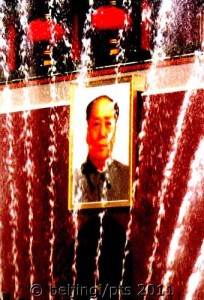Peter Sampson sends one of his occasional observatory letters from Beijing.
 Some months ago, an aspiring Chinese lawyer explained to me that, if I was ever to understand modern China, I would have to understand that, for Chinese people: ‘If you have no money, you are nothing. If I don’t know you, you are like air.’
Some months ago, an aspiring Chinese lawyer explained to me that, if I was ever to understand modern China, I would have to understand that, for Chinese people: ‘If you have no money, you are nothing. If I don’t know you, you are like air.’
Winter is almost upon us in Beijing. The temperatures are dropping, the red-jacketed prostitutes are shivering in the cold, under cover of foliage and pollution in the shadows of the Airport Expressway, and the foreign, ex-pat population grows by the day.
Winter will be harsh. The powerful winds bring a piercing, dry cold, and the city will withdraw into itself. Long days at work, as the twenty million-plus population drives the economy forward, and long evenings at home, warmed by government controlled heating.
The internet is much-loved by Chinese citizens. There is on-line talk of the inefficiency and corruption displayed by the current leadership. There are micro-blogs, there are Chinese versions of Facebook and Twitter, and a plethora of sites dedicated to helping like-minded souls find each other. The internet provides channels of communication that people have not had here in previous times – a space in which to communicate that they warm to enthusiastically, and which the authorities monitor/ censor with equal zest. The hours that will be spent (by censors and citizens) on-line in China this winter will be almost beyond calculation.
Amidst the cold winds and the breakneck development that is Beijing, there comes news of riots in a far-flung Province as a result of a policeman killing five people while driving home drunk. It follows fast on the heels of internet coverage of a young girl being run over by a driver, and ignored by eighteen passers-by in the street. Run over again by a further vehicle, she eventually died.
Some say that there is a vacuum at the heart of modern China. They say that the Cultural Revolution and the history of the country means that people act without any sense of a compass to guide them, or to react against. They say that Beijing – and China – is a place without love.
It’s a vacuum, if it exists, that foreign capital is happy to explore.
Beijing reverberates to the sound and presence of American and European multi-national companies. They fly the company flag happily next to the Chinese flag outside their plush offices. They export American and European executives who find themselves involved in a business model that is like their own, but different. In Beijing, business can be done the way any executive would like it to be done -with girls, with wine, with food and with bribes. Only here, there is no guilt – only government approval.
As the low-end prostitutes shiver in the darkness of the underbelly of the Airport Expressway, it’s business as usual in Beijing.
Photographs of people and places in Beijing can be viewed at www.beijingi.info


